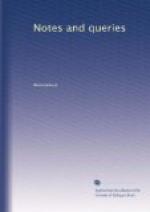“Sir Thomas Miller possesses the original Minutes of this Assembly of the Peers in the handwriting of a Mr. Glyn, who acted as secretary. His appointment to that situation is also preserved; and, as it is signed by all the Lords who were present, it affords evidence of the names of the Peers who took part in the business of the Assembly, and contains a very interesting collection of autographs.
“The MS. itself is a small folio, but not above fifty pages are filled. It comprises the period between the 11th and the 28th December, 1688, both days inclusive, and appears to be a perfect Record of every act of that memorable Assembly. The indorsement on the cover merits notice: it states with singular minuteness the precise hour of James’s abdication, namely at one in the morning of the 11th of December, 1688.”
Sir Thomas Miller also possessed a manuscript, containing an “Account of the Earl of Rochester, Captain Kendall, and the Narrator’s Journey to Salisbury with King James, Monday, Nov. 19. to Friday, Nov. 23. 1688, inclusive.”
In connection with this subject, it may be noticed that there is no entry of any payment in the Issue Books of the clerks of the Pells between Tuesday, 11th December, and Monday, 24th December, 1688. J.E.
[Perhaps some of our correspondents
could inform us where the MSS.
in question are now deposited.]
[5] After mentioning the excesses committed by the mob, and the arrest of Judge Jefferies, Bishop Burnet says: “The Lord Mayor was so struck with the terror of this rude populace, and with the disgrace of a man who had made all people tremble before him, that he fell into fits upon it, of which he died soon after.
“To prevent the further growth of such disasters, he called a Meeting of the Privy Councillors and Peers, who meet at Guildhall,” &c. The pronoun he must relate to the Lord Mayor, but the sentence is obscurely expressed.
[6] Vol. ii. pp. 259, 260.
* * * * *
OPINIONS OF WRITERS ON ENGLISH HISTORY, NO. 1.
“Oh, do not read history,
for that I know must be false.”—SIR
ROBERT WALPOLE.
Sir,—I have, from time to time, made a few notes on our historical writers—rather I should say the conflicting opinions of critical writers on their relative value, and the dependence to be placed on them as historical guides. They are so opposite, as would in a great measure confirm the opinion of the celebrated statesman above quoted. I send, as a specimen, the opinions upon Burnet, and should its insertion in your “NOTES AND QUERIES” be deemed advisable, I will from time to time send others which I have in my note-book.
M.
Burnet, “A good historian and an honest man.”—Lord Brougham.
“The History of his Own Times, which Burnet left behind him, is a work of great instruction and amusement.... His ignorance of parliamentary forms has led him into some errors, it would be absurd to deny, but these faults do not detract from the general usefulness of his work.”—Lord John Russell.




